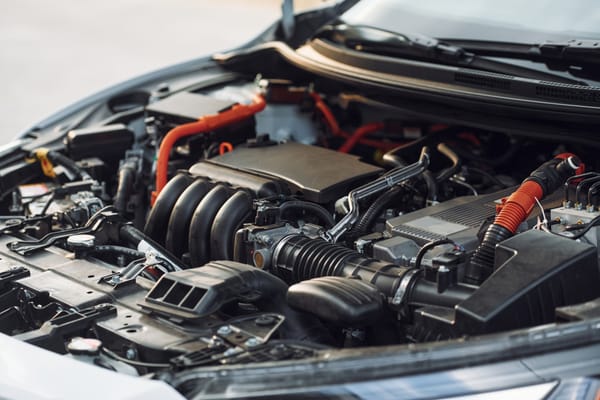I Trusted the Wrong Mechanic: A Eulogy for My Car’s Transmission

“Whoever coined the phrase 'Nairobi ni shamba la mawe' had clearly been handed a character development lesson by the hustle,” Korir Amos, my good friend, says as he narrates his ordeal with Nairobi mechanics.
Korir is a 34-year-old entrepreneur with a knack for business. From his base in Njomoko, near Thika, he runs a thriving venture supplying avocado, mango, macadamia, and vegetable seedlings from Meru’s fertile highlands to farmers across Nairobi and Central Kenya.
Reliability is the backbone of his work. Farmers book seedlings months in advance. Deliveries have to hit tight planting seasons. A missed deadline can ruin an entire year of farming.
That’s why in late 2021, he quit his job as a digital marketing strategist, sold his 2018 Suzuki Swift for Ksh. 1.8 million, topped up Ksh. 700,000 and invested in a 2014 Isuzu D-Max double cab. Tough, spacious, dependable, the kind of pickup every Kenyan businessperson dreams of. For three years, it did exactly what it promised.
Until last November 2024, when the gearbox collapsed spectacularly on Kamiti Road. Not because Korir ignored it. Not because he was careless. But because, in a moment of misplaced trust, he handed his D-Max to the wrong hands.
The classic Kenyan mistake.
The First Warning Signs
Three months earlier, Korir started hearing it, a faint whining sound whenever the pickup shifted gears under load. Not alarming, but unusual.
He didn’t shrug it off. He wasn’t reckless. He drove straight to a garage recommended by a fellow driver who supplies miraa to the Nairobi market. His was a Toyota Hillux, and it was fine, but for any mechanical issues, this mech was the go-to person.
The sign outside his shop in Ngara read “Specialist in All Japanese Cars”, the kind of place you see everywhere in Kenya, with two cars on jacks, an oil drum in the corner, and mechanics in overalls holding spanners like surgical tools.
“Ni gearbox tu, hakuna shida kubwa,” the foreman told him confidently. “We’ll flush the fluid, add new oil, and she’ll be fine.”
Korir strolled to a nearby kibanda for breakfast: the typical chai moto, two mandazis, and scrambled eggs that tasted better than they looked. By the time he wandered back:
- The mechanic was bent under the bonnet
- Wiping his hands dramatically on an oily rag
The “final touches” looked impressive enough:
- Tightening random bolts
- Topping up fluid from a dusty jerrycan,
- And tapping the gearbox housing like a doctor testing reflexes
- With a satisfied nod, he declared the D-Max cured
It sounded reasonable. Korir paid Ksh. 7,500 for the service, shook hands, and drove away reassured.
The Slow Death
For a while, the noise quietened. Korir even congratulated himself for acting quickly. Problem solved, right?
But bad repairs have a way of pretending they work, until they don’t.
Unknown to him, the garage hadn’t used the correct transmission fluid. What went into the D-Max was cheaper, low-grade oil that looked the part but wasn’t built for heavy work. Instead of protecting the gearbox, it broke down under heat and slowly ate away at the system.
Two weeks later, the whining returned. At first, Korir assumed it was just the gearbox “settling in” after the service. The foreman had assured him it was fine. But it got louder.
This time, he frowned and went back to the mechanic.
“Si tulishafanya hii kitu?” he asked.
The foreman leaned on the fender, rag over his shoulder, confidence dripping from his voice.
“Boss, hakuna shida. Hii ni kawaida after flush. Gearbox inasafisha yenyewe. We’ll top up again, and she’ll be smooth. If you delay, that’s when it becomes real damage.”
After paying some Ksh. 3,000 (because he came back with the same problem the mech had said was fixed), and him not being able to afford downtime, he drove off. He had deliveries to make. And the D-Max was still moving.
Business Demands, Vehicle Struggles
Each week, Korir clocked nearly 800 kilometres, hauling seedlings from Meru to farms in Nairobi, Murang’a, Thika, and Kiambu. His pickup wasn’t just a vehicle. It was his lifeline, his brand, his guarantee of reliability.
But under the surface, the gearbox was deteriorating. Every delivery added more wear, more heat, more damage.
By the time he noticed occasional slipping during gear changes, it was already too late.
The Final Breakdown
The second week of November 2024 started with promise. A bulk order of 1000 tomato seedlings to a greenhouse farmer along Kamiti Road, right there at the rough road leading to the shooting ridge, and 100 seedlings to a farmer in Githunguri, Kiambu. The invoice could definitely fund nursery expansion.
But the roads had other plans.
After making a stop and helping the farmer unload the tomato seedlings carefully, he started his car to make a final run to Githunguri to deliver the rest. He shifted the car’s gear into drive. That’s when the transmission unleashed its final act: a screech, a burning smell, then a thunderous metallic clunk.
And then silence.
The D-Max refused to move. The gear lever felt loose, like stirring watery porridge. His transmission was gone. Hazard lights flashing, He sat helplessly as his customer looked at him with pitiful eyes.
“Gari imekufa?” he politely asked. Korir nodded, knowing well it was that damn noise from weeks earlier.
After a short conversation and the client offering to call a mechanic he knows, he arrived, half an hour later. He peered under the bonnet, shook his head, and declared: “Transmission imeisha kabisa.”
Korir could only nod.
Counting the Damage
The tow truck arrived. Price: Ksh. 5,000 to haul the D-Max to an Isuzu-certified garage in Kiambu.
There, the head mechanic broke the bad news: “Transmission imeharibika kabisa. The wrong fluid was used. The clutches are burned out. You need a full replacement.”
- A new genuine Isuzu 5-speed automatic transmission? Ksh. 320,000 plus labour.
- A reconditioned one? Around Ksh. 200,000–250,000. Still painful.
And the most bitter pill: if Korir had gone to a certified service centre from the start, the fix would have been a simple Ksh. 15,000 fluid change.
The financial hit was brutal. But the bigger blow was professional.
Korir had to use those “ask for transport” guys to deliver the seedlings to the farmer. While his business was still intact, the real headache was the nagging question: why was his own trusted vehicle failing him after two “repairs”?
Lessons from the Wrong Garage
If Korir’s transmission could leave behind a will, it would contain these lessons:
- Cheap fixes cost the most. Saving Ksh. 5,000 with a quack mechanic ended up costing KSh 320,000.
- Always use the right fluids. Automatic transmissions are picky. Wrong oil is slow poison.
- Not every mechanic is a specialist. Just because the signboard says “expert” doesn’t mean they are.
- Your vehicle is your business partner. Protect it with the same care you protect your cash flow.
- Certified service matters. Dealers and trusted garages might charge more upfront, but they save you from disasters later.
- Preventive maintenance beats emergency prayers. A small service could have kept his gearbox alive.
Want to Minimise Chances of Korir’s Fate? Peach It!
At Peach Cars, every vehicle undergoes a 288-point inspection before it’s sold. That means when you buy a pickup from us, you’re not inheriting a stranger’s botched repairs or fake fluids.
We check, we verify, and we guarantee that what you drive off with won’t leave you stranded on Kamiti Road while boda riders laugh.
Korir learned the hard way. You don’t have to.
Browse our range of inspected, road-ready vehicles at Peach Cars. Because smart business owners prevent disasters instead of patching them.




